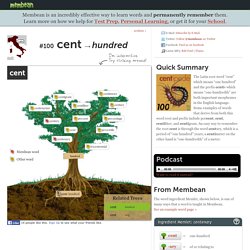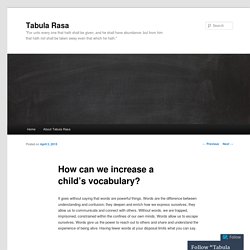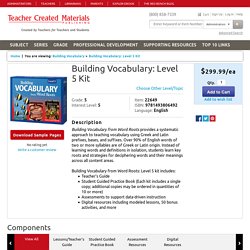

Word Root Of The Day: cent. The Latin root word cent, “one hundred” and the prefix centi-, “one-hundredth” are important morphemes in the English language.

Although I won’t be giving one hundred examples of words that include cent and centi-, I will give you a few “pennies” or “cents” for your thoughts! A cent is simply “one-hundredth” of a dollar, so that “one hundred” cents comprise one dollar. The concept of percent, or per “hundred,” is a calculation of how much out of “one hundred” parts something is. For instance, if 70 percent of the human body is comprised of water, then 70 parts of 100 would be water. The percentage correct that you get on a test is simply the number right you would have if the test itself were based upon “100” points. These days, living for an entire century, or a full “one hundred” years, is not so uncommon any more.
Having not quite lived up to a full “one hundred” examples for cent, I will promise to give more than “one-hundredth” of an example for the prefix centi-! How can we increase a child’s vocabulary? It goes without saying that words are powerful things.

Words are the difference between understanding and confusion; they deepen and enrich how we express ourselves; they allow us to communicate and connect with others. Without words, we are trapped, imprisoned, constrained within the confines of our own minds. Words allow us to escape ourselves. Words give us the power to reach out to others and share and understand the experience of being alive. Having fewer words at your disposal limits what you can say. It is upsetting, therefore, that studies have shown that children from language-impoverished families may only hear as few as 13 million words before the age of 4. If we do nothing to address this gap, it will only increase as children get older.
Teachers may feel startled and disempowered by such stats. As ever, I don’t propose to have all the answers. Step 1: Assessment As with a lot of things, it is vital to know where pupils are at when they come to you. Teaching content-rich lessons. I recently read this in a blog post by Doug Lemov.

One of the challenges of Hirsch or Christodoulou if you’re a teacher is that many of the requisite actions–a curriculum that prizes and emphasizes knowledge development in a systematic way, are beyond the purview of the individual teacher. Those tend to be school- or district-level decisions. So how do I take individual action?
This is an important question with no easy answer. Lemov is completely right to note that what you teach is often a school, district or (in England) a government and exam board decision. So, if you are individual teacher looking to make your lessons more knowledge-rich, what can you do? Often, explicit vocabulary instruction can seem pointless. Fortunately, there was a brilliant book out there which made sense of all these problems. Here are Beck, McKeown and Kucan’s responses to the problems I outlined above. Starting with Prefixes and Suffixes. Practice with Prefixes.
Building Vocabulary: Level 5 Kit. Choose Other Level/Topic Grade: 5 Interest Level: 5 Item: 22649 ISBN: 9781493806492 Language: English Description Building Vocabulary from Word Roots provides a systematic approach to teaching vocabulary using Greek and Latin prefixes, bases, and suffixes.

Over 90% of English words of two or more syllables are of Greek or Latin origin. Instead of learning words and definitions in isolation, students learn key roots and strategies for deciphering words and their meanings across all content areas. Building Vocabulary from Word Roots: Level 5 kit includes: Teacher's GuideStudent Guided Practice Book (Each kit includes a single copy; additional copies may be ordered in quantities of 10 or more)Assessments to support data-driven instructionDigital resources including modeled lessons, 50 bonus activities, and more Series highlights include: Teacher's Guide Guided Practice Assessments Digital Resources. Word Generation - Home.